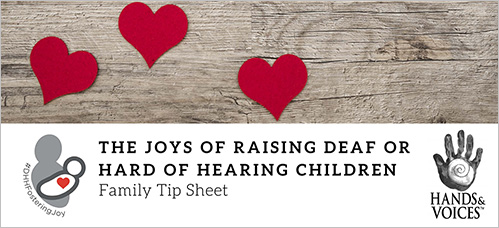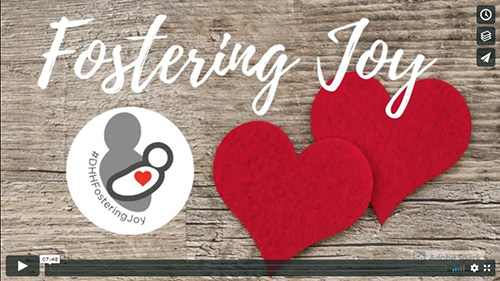Self-Care Station
Raising children is an experience like no other: the joy, the busyness, the lack of sleep, the desire to be a good parent. And then add to that possibility or confirmation that your child is deaf or hard of hearing and those highs and lows intensify.
With added responsibilities such as managing hearing and assistive technology, developing effective communication, advocating for your child’s needs, and navigating tele-communication, parents understandably can become bogged down in their role. While these additional responsibilities can be overwhelming at times, it is also critical to focus on your own emotional well-being, to bond with your child, and to encourage your child’s healthy social-emotional development. Here are some tools to help you tend to your health as well as your family’s.
Ideas to Consider:

- Build a network of respite care whether it be a formal program through your county or an informal babysitting swap with friends who have the necessary skills or training to care for your child.
- Build in time to nurture relationships such as a spouse/significant other, other children, and friendships.
- Set up rituals that revive: yoga, meditation, massage, long walks, reading, conversations with a friend, hobbies, exercise, a gratitude practice, journaling, organizing/cleaning, baths, essential oils, favorite cup of coffee or tea.
- Carve out time for fun and create joy moments throughout your day.
- Connect virtually or in-person with other families who have children who are d/hh.
- Be comfortable seeking professional help or therapy, especially those who have experience with parents raising children with health challenges.
- Take time to just be alone. To do nothing. Sleep. Or just allow yourself to feel all the feelings that are weighing on you. And then make the decision to let them go and move on.
Resources:
- Fostering Joy Project: Fostering Joy is an intentional practice of looking for and encouraging joyful moments between you/your family and your child who is deaf or hard of hearing (d/hh) to promote emotional health and development. Resources include:

- Fostering Joy Family Tip Sheets: Provided in a variety of languages, these tips sheets offer you and your family suggestions on how to make a conscious effort to create and celebrate joyful experiences with your child who is d/hh.

- Fostering Joy Video: This video is a compilation of pictures and quotes from families who responded to the question, “How does your child who is d/hh bring you joy?”

“Among families with deaf or hard of hearing children, taking care of the special needs of family members and having insufficient relief from stress were rated as having the greatest negative impact on Family Quality of Life.”
- Jackson, Wegner & Turnbull, 2010
“Caring for oneself is not selfish. When you care for yourself, you are modeling for your children that they, too, should value themselves.”
- Amy Szarkowski,
Psychologist, LEND, Boston Children's Hospital; Harvard Medical School; Children’s Center for Communication/Beverly School for the Deaf
“Fostering Joy means finding happiness in the little things. Leaving behind our plans our expectations and just living.”
- Toni Vega, Parent
“We will also take away the knowledge of how to confidently and effectively advocate for our children, along with the understanding that it is okay to take a break and do something for ourselves...and not feel guilty about it!”
- Kim Shauer, Parent
“Make it a priority to focus on self-care. If you are unable to take care of yourself holistically, it may become foggy to make important decisions for your family, especially your deaf/hard of hearing child. Seek and embrace a healthy support system, seek joy in every circumstance, and be open to EVERY opportunity, option, optimistic encouragement (and hugs!)”
- Emily Burke, parent and Deaf adult